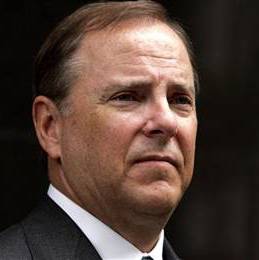 This post from last week noted some interesting docket entries in former Enron CEO Jeff Skilling’s Fifth Circuit appeal of his conviction on criminal charges in connection with the demise of Enron.
This post from last week noted some interesting docket entries in former Enron CEO Jeff Skilling’s Fifth Circuit appeal of his conviction on criminal charges in connection with the demise of Enron.
Now, it looks as if the mainstream media is picking up on the issue. The Houston Chronicle’s Kristen Hays, who is one of the only mainstream media reporters continuing to follow-up on the Enron-related criminal cases, reports here on a couple of the pleadings referenced in the docket entries from last week that apparently were not placed under seal when filed.
Although a copy of the pleadings that Hays was able to review are not included in the article, it appears clear that the government is scrambling in an attempt to contain public disclosure of exculpatory evidence that is contained in the interview notes of former Enron CFO and chief Skilling accuser, Andrew Fastow:
[Skilling attorney Daniel] Petrocelli and his team have since examined the notes. They want to file an additional brief arguing that the notes contain much information that is favorable to Skilling, and prosecutors and Lake wrongly denied him access to the notes before the trial.He said the notes reveal evidence that is “a sledgehammer that destroys Fastow’s testimony” against Skilling, “infecting virtually every facet” of the government’s case.Petrocelli also asked the 5th Circuit to accept his new brief as a public document, which he said quotes liberally from the Fastow notes.
The controversy regarding what Fastow told prosecutors and FBI agents who were investigating Enron became a big issue in the Lay-Skilling prosecution when the prosecution took the unusual step of providing the Lay-Skilling defense team a “composite summary” of the Form 302 (“302’s”) interview reports that federal agents prepared in connection with their interviews of Fastow. Those composites claimed that the Fastow interviews provided no exculpatory information for the Lay-Skilling defense, even though Fastow’s later testimony at trial indicated all sorts of inconsistencies.
However, I have spoken with several former federal prosecutors about this issue and all believe that the government has a big problem in the Skilling case on the way in which the information from the Fastow interviews was provided to the Lay-Skilling defense team. None of these former prosecutors ever prepared a composite 302 in one of their cases or ever used such a composite in one of their cases. The process of taking all the Fastow interview notes or draft 302’s and creating a composite is offensive in that it allowed the prosecution to mask inconsistencies and changing stories that Fastow told investigators as he negotiated a better plea deal from the prosecutors.
Similarly, the Enron Task Force’s apparent destruction of all drafts of the individual 302s of the Fastow interviews in connection with preparing the final composite is equally troubling. Traditionally, federal agents maintain their rough notes and destroy draft 302s. However, in regard to the Fastow interviews, my sense is that the draft 302s were not drafts in the traditional sense. They were probably finished 302’s that were deemed “drafts” when the Enron Task Force decided to prepare a composite summary of the 302’s.
Update: Larry Ribstein comments on the implications that criminalizing the actions of Skilling and Lay has on their prosecutors in light of their actions.

Thank you for your continuing attention to this. It seems to me that 302s should always be viewed as prosecution spin documents. I have seen 302s in which entire segments of the interviews, usually involving exculpatory information, have been excluded from the 302s. I suspect that if defendants could get their hands on the raw notes, they would find that prosecutors routinely shape the testimony of witnesses, particularly in situations where they hold considerable power over the witness (as in the Fastow situation).
To add to the fiasco, a “composite summary” compiled from multiple 302s is surely a farce — this simply amounts to more spinning of the spin documents (I guess you could call a composite 302 a “meta-spin” document). Let’s hope that this practice gets some public exposure and discussion as a result of this current controversy.
Isn’t it all so delicious? I absolutely *love* Petrocelli’s ‘sledgehammer’ comment.
Fantastic article, as usual, Tom.
Skilling is just a nice guy who was in the wrong place at the wrong time with the wrong people doing the wrong things with the wrong legality! It could have happened to any billionaire!
You are right, right thinking girl. He was at wrong place at wrong time